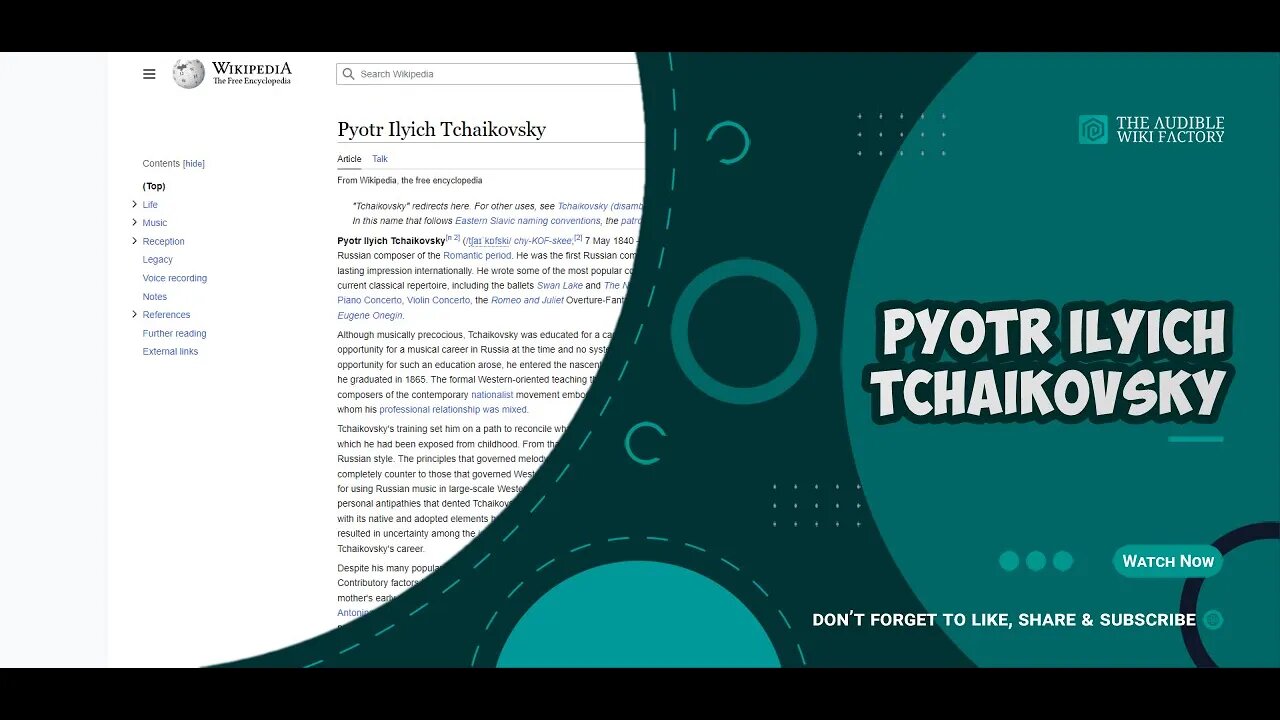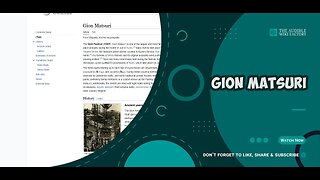Premium Only Content

Pyotr Ilyich Tchaikovsky was a Russian composer of the Romantic period. He was the first
Pyotr Ilyich Tchaikovsky was a Russian composer of the Romantic period. He was the first Russian composer whose music would make a lasting impression internationally. He wrote some of the most popular concert and theatrical music in the current classical repertoire, including the ballets Swan Lake and The Nutcracker, the 1812 Overture, his First Piano Concerto, Violin Concerto, the Romeo and Juliet Overture-Fantasy, several symphonies, and the opera Eugene Onegin.
Although musically precocious, Tchaikovsky was educated for a career as a civil servant as there was little opportunity for a musical career in Russia at the time and no system of public music education. When an opportunity for such an education arose, he entered the nascent Saint Petersburg Conservatory, from which he graduated in 1865. The formal Western-oriented teaching that he received there set him apart from composers of the contemporary nationalist movement embodied by the Russian composers of The Five with whom his professional relationship was mixed.
Tchaikovsky's training set him on a path to reconcile what he had learned with the native musical practices to which he had been exposed from childhood. From that reconciliation, he forged a personal but unmistakably Russian style. The principles that governed melody, harmony and other fundamentals of Russian music ran completely counter to those that governed Western European music, which seemed to defeat the potential for using Russian music in large-scale Western composition or for forming a composite style, and it caused personal antipathies that dented Tchaikovsky's self-confidence. Russian culture exhibited a split personality, with its native and adopted elements having drifted apart increasingly since the time of Peter the Great. That resulted in uncertainty among the intelligentsia about the country's national identity, an ambiguity mirrored in Tchaikovsky's career.
Despite his many popular successes, Tchaikovsky's life was punctuated by personal crises and depression. Contributory factors included his early separation from his mother for boarding school followed by his mother's early death, the death of his close friend and colleague Nikolai Rubinstein, his failed marriage with Antonina Miliukova, and the collapse of his 13-year association with the wealthy patroness Nadezhda von Meck. His homosexuality, which he kept private, has traditionally also been considered a major factor though some scholars have downplayed its importance. Tchaikovsky's sudden death at the age of 53 is generally ascribed to cholera, but there is an ongoing debate as to whether cholera was indeed the cause and whether the death was accidental or intentional.
While his music has remained popular among audiences, critical opinions were initially mixed. Some Russians did not feel it was sufficiently representative of native musical values and expressed suspicion that Europeans accepted the music for its Western elements. In an apparent reinforcement of the latter claim, some Europeans lauded Tchaikovsky for offering music more substantive than base exoticism and said he transcended stereotypes of Russian classical music. Others dismissed Tchaikovsky's music as "lacking in elevated thought" and derided its formal workings as deficient because they did not stringently follow Western principles.
CHILDHOOD
Pyotr Ilyich Tchaikovsky was born on 7 May 1840 in Votkinsk, a small town in Vyatka Governorate (present-day Udmurtia) in the Russian Empire, into a family with a long history of military service. His father, Ilya Petrovich Tchaikovsky, had served as a lieutenant colonel and engineer in the Department of Mines, and would manage the Kamsko-Votkinsk Ironworks. His grandfather, Pyotr Fedorovich Tchaikovsky, was born in the...
LINK TO ARTICLE: http://en.wikipedia.org/wiki/Pyotr_Ilyich_Tchaikovsky
TAGS: Pyotr Ilyich Tchaikovsky, Russian Romantic composers, Russian people of Ukrainian descent, Russian people of French descent, Russian opera composers, Russian untitled nobility, Russian music educators, Russian music critics, Russian male classical composers, Russian classical pianists, Russian ballet composers, Recipients of the Order of St. Vladimir 4th class, Pupils of Nikolai Zaremba, People from Sarapulsky Uyezd, People from Votkinsk, Moscow Conservatory academic personnel, Male opera composers, Male classical pianists, LGBT musicians from Russia, LGBT Eastern Orthodox Christians, LGBT classical musicians, LGBT classical composers, Imperial School of Jurisprudence alumni, Honorary Members of the Royal Philharmonic Society, Deaths from cholera, Composers for piano, Classical composers of church music, Burials at Tikhvin Cemetery, 19th-century male musicians, 19th-century LGBT people
#GeneralKnowledge #AudibleWikiFactory #Audible #Wikipedia #PyotrIlyichTchaikovsky
-
 6:00
6:00
The Audible Wiki Factory
2 years agoThe Gion Festival is one of the largest and most famous festivals in Japan, taking place
411 -
 LIVE
LIVE
Discover Crypto
1 hour agoBitcoin GOLD RUSH 2025: THIS State Going ALL IN!
254 watching -
 LIVE
LIVE
Rethinking the Dollar
19 minutes agoThe Damage Is Unrepairable: It's To Late To Go Back NOW! | Morning Check-In
59 watching -
 LIVE
LIVE
Bannons War Room
2 months agoWarRoom Live
18,600 watching -
 1:13:13
1:13:13
Dear America
15 hours agoTrump’s Top Accomplishments That Will SILENCE The Left + Dem Rep. Introduces Impeachment Articles!
60K21 -
![🔴[LIVE TRADING] Trump Admin Discusses New Trade Deals || The MK Show](https://1a-1791.com/video/fww1/4d/s8/1/Z/T/9/F/ZT9Fy.0kob-small-The-MK-Show-Apr.-29th.jpg) LIVE
LIVE
Matt Kohrs
8 hours ago🔴[LIVE TRADING] Trump Admin Discusses New Trade Deals || The MK Show
1,102 watching -
 LIVE
LIVE
Wendy Bell Radio
6 hours agoEven the Left Knows It's Too Far Left
8,924 watching -
 LIVE
LIVE
NEWSMAX
2 hours agoThe Gerry Callahan Show LIVE (04/29/2025) | NEWSMAX Podcasts
487 watching -
 43:19
43:19
Randi Hipper
1 hour agoBLACKROCK BUYS NEARLY $1 BILLION WORTH OF BITCOIN
7.66K -

2 MIKES LIVE
2 hours agoTHE MIKE SCHWARTZ SHOW with DR. MICHAEL J SCHWARTZ 04-29-2025
9.11K1